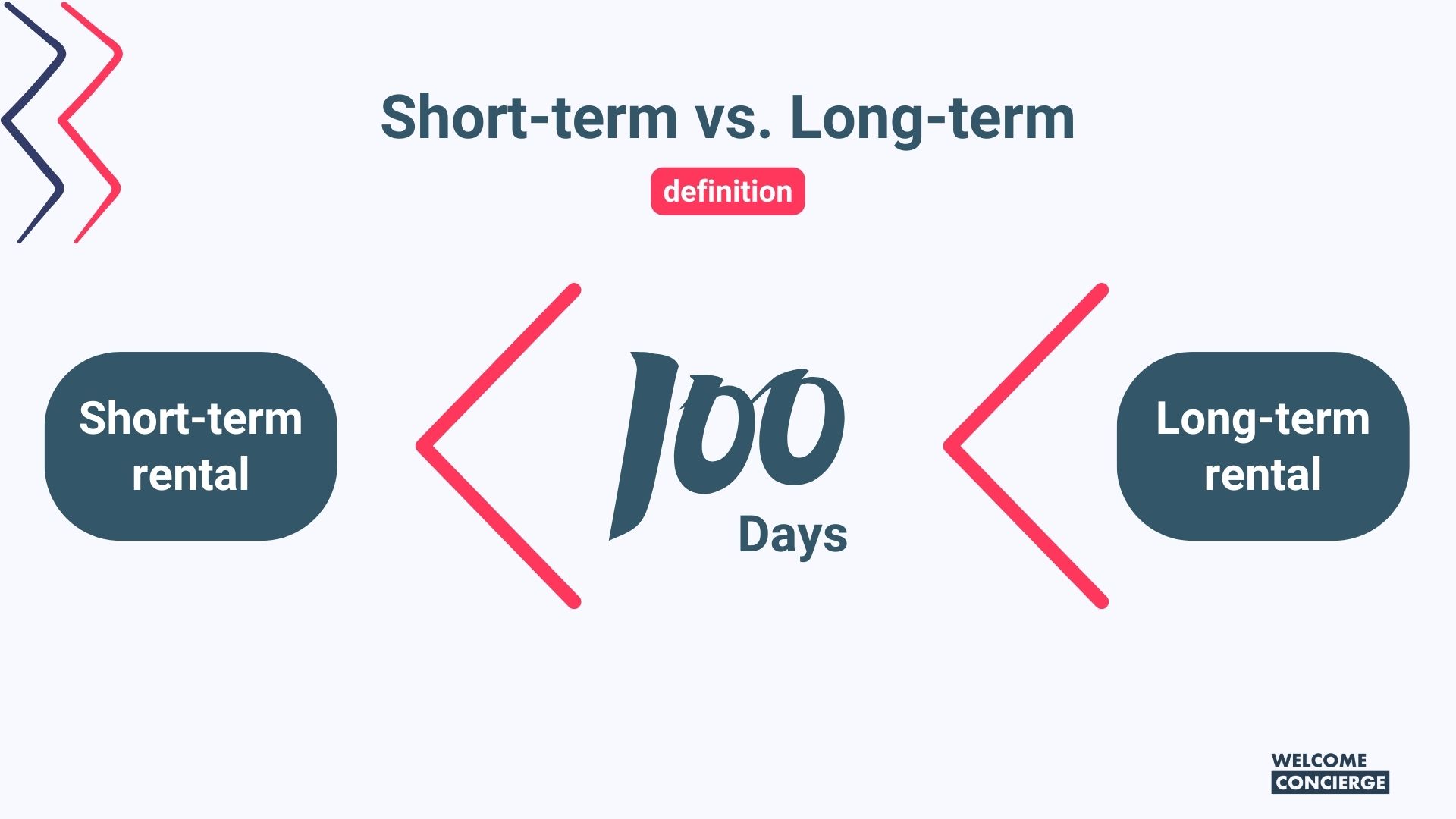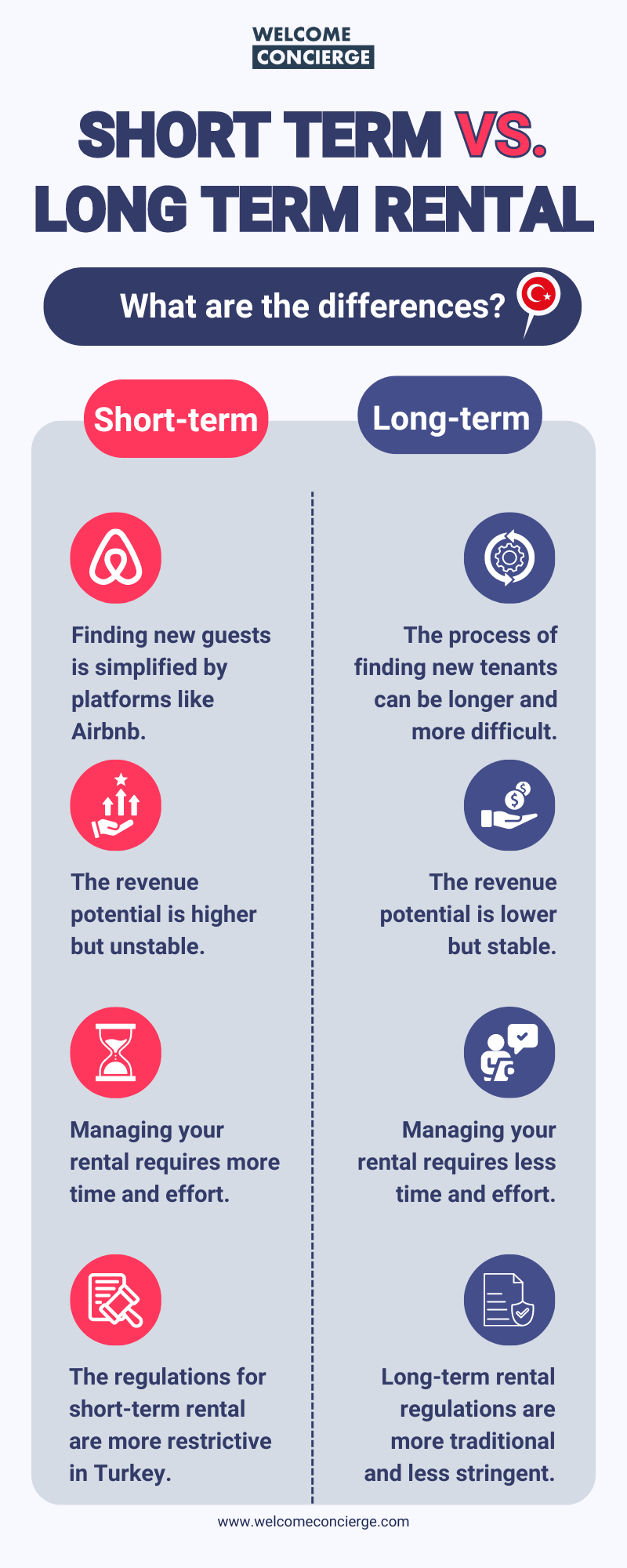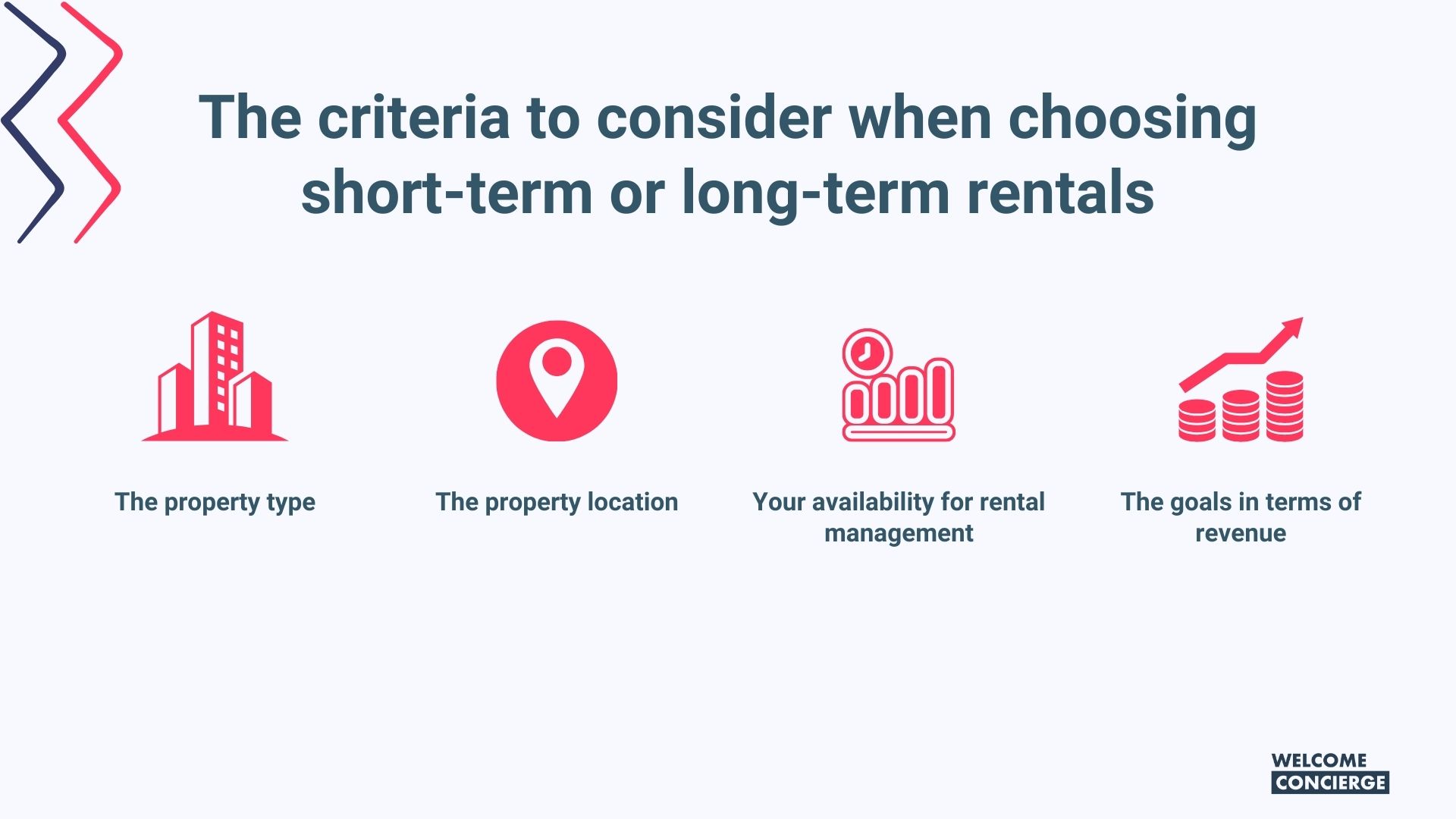As a homeowner who wants to rent his or her property in Turkey, the first thing you would consider is the earnings you will get from this business. Whether you choose short-term or long-term rental, your first goal is to maximize your income. However, the choice is not that obvious since, let’s admit it, each type of investment has its advantages and risks. In this blog post, we will cover the main differences between short-term and long-term rentals and give you insights that will help you choose the perfect option for your property and your goals.
Long-term vs. long-term, what’s the difference?
According to the Turkish Official Gazette, it is considered a short-term rental if the rental’s duration doesn’t exceed 100 days. Thus, if you rent your property longer, you are dealing with a long-term rental business.

Now that the definition of each type of rental investment is clear, let’s dive into the principal differences between them.
First of all, the regulation varies quite a lot between long-term and short-term rentals, especially after the release of the new Turkish law in January 2024. Hence, new requirements have emerged transforming the whole process of property rental for tourism purposes, so-called short-term rental.
Short-term rental New regulations in Turkey
Here are the main requirements you must satisfy before renting your property for tourism purposes:
- You must obtain a tourism house license. To do so, you must submit an online application to the Turkish Ministry of Culture and Tourism. The documents to insert in your application include the approval of all floor neighbors regarding the rental on a short-term basis.
- You must hang the tourism house plaque delivered with your tourism house permit on the entrance of your property.
- Your property must respect some qualifications including having the minimum amenities
Long-term rental characterizations
Long-term rental is the traditional way to rent your property. The first advantage of this type of investment is the stability of revenues. If you choose this option, you guarantee a continued flow of earnings in the long term. The other good aspect is that you do not have to deal with tenants regularly. You don’t have many repairs and maintenance to manage as well. Hence, you can save time and effort while having a stable income for several months.
Meanwhile, long-term rental also has some disadvantages among which we can mention:
- The process of finding long-term high-quality tenants can be time-consuming and even difficult
- The revenue potential is lower compared to short-term rental since ROI is 5-10% for long-term while it is 10-20% for Airbnb
Short-term rental pros and cons
Like a long-term rental, renting your property for tourism has pros and cons, which we will explore below.
Unlike long-term rentals, the revenue potential when you provide an Airbnb service is higher, since the prices applicable for short-term rentals are more attractive in terms of profit.
Also, you have more options for finding short-term tenants, especially on platforms like Airbnb.
However, before you decide which type to invest in, you should be aware that short-term rentals also have their drawbacks:
- You have to devote more time and effort to managing the various tenants, responding to their needs, and resolving any problems they face
- You need to budget for upkeep and cleaning between rentals.
- You need to be vigilant concerning Airbnb regulations in Turkey, which are more restrictive than those for long-term rentals
That being said, before you make your choice, there are some criteria you should consider. Let’s discover them together.

Short-term vs. long-term: which one to choose?
Even though you know the differences between short-term and long-term rentals, you still need to decide which way to go. Don’t worry! We have selected the main criteria to examine while choosing the type of rental investment for your property.

The property type and location
Short-term rentals are better suitable for travelers who seek a place to stay during their vacation while long-term rentals are chosen by people who are searching for a residence to live in for a longer period.
If your accommodation is a vacation home in a tourist town like Antalya or Alanya, it’s better to choose a short-term rental. On the other hand, if your home is in a residential building in a quieter town, a long-term rental is the best option.
Your availability and the time you can dedicate to managing your rentals
As we mentioned above, renting your property for tourism purposes requires time and effort. You need to be available to answer your guests’ needs regularly.
Of course, there is another option! It is to hire a property manager who will take care of all the aspects of short-term rentals including maintenance, cleaning, guest welcoming, etc.
Welcome Concierge connects you with the right partner in Turkey to optimize your property management and maximize your earnings whether it is for long-term or short-term rentals. Reach out now and let’s discuss this opportunity together!
In short, if you’re way too busy to manage short-term rentals or you just cannot afford a property manager, renting your property for the long term is more interesting for you.
Regardless of the option you select, Welcome Concierge can manage your property efficiently—optimizing it for short-term rentals or handling tenant relations for long-term leases.
Your goals in terms of revenues
One of the main differences between long and short-term rentals is the level of revenue. If you would like to have a stable source of earnings, you’d better go for long-term rentals. However, if you want to gain a higher daily rate, then, short-term rentals are a more profitable option.
Depending on your evaluation of the criteria we mentioned, you should be able to choose the most suitable type of rental investment for your property.
If you need assistance with your rental business either in terms of regulations in Turkey, property management, or concerning the most attractive cities to invest in, we’ve got you covered. Get in touch now and benefit from professional assistance to optimize your rental income.



